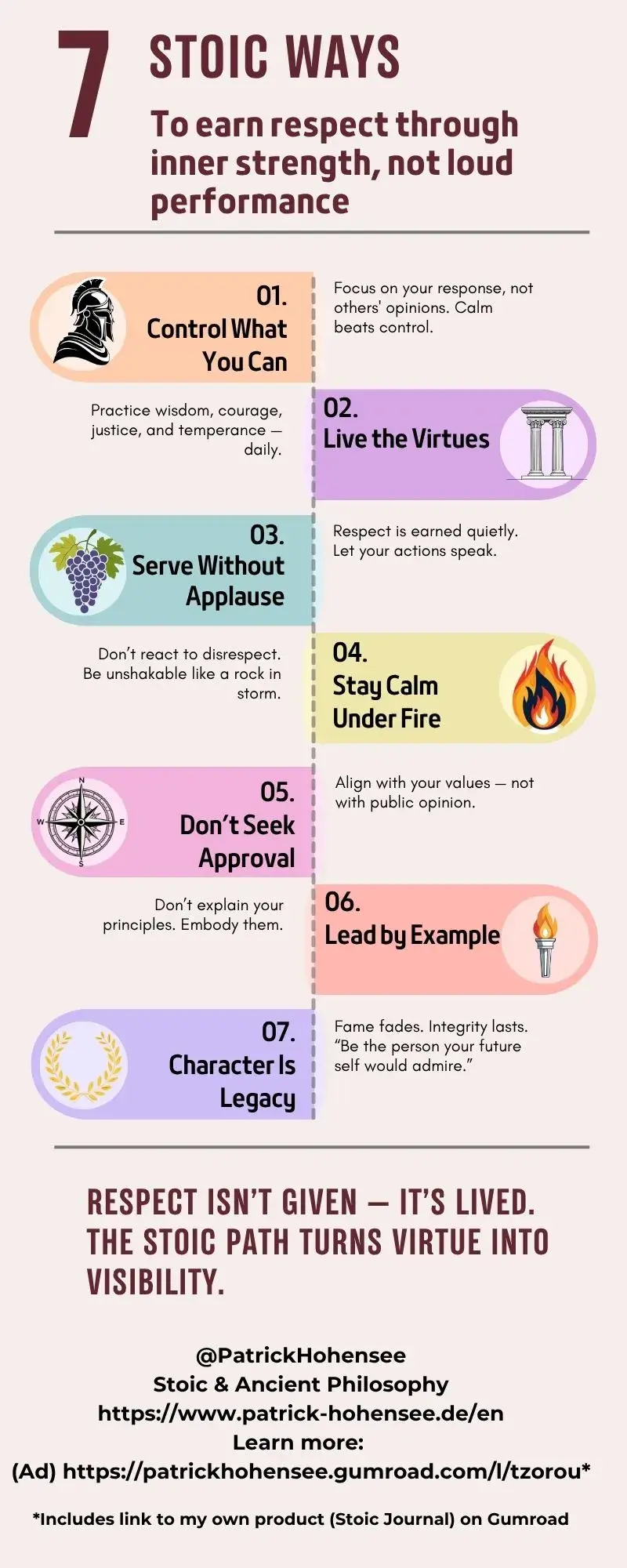Earn Respect with Stoic Discipline: Personal Growth the Ancient Way
- Patrick Hohensee
- Jun 30, 2025
- 4 min read

Introduction: Respect Can’t Be Demanded—It Must Be Earned
You may have experienced it yourself: in meetings, social situations, or even at home, you want to be heard, appreciated, respected. Yet no matter how competent or well-meaning you are, true respect often feels elusive.
Respect, unlike attention or obedience, can't be forced. It must be earned—over time, through character.
Modern self-help books focus on charisma, communication hacks, and persuasion techniques. But over 2000 years ago, Stoic philosophers taught something deeper: respect is a natural byproduct of living with integrity, self-mastery, and consistency.
Today, we’ll explore how Stoicism offers timeless guidance to cultivate the kind of inner strength and character that earns respect organically—without chasing it.
1. Respect Begins with Self-Respect
Epictetus reminds us:
No man is free who is not master of himself.
The Stoics taught that self-respect isn’t a feeling, but a way of life. It means aligning your actions with your values—especially when no one is watching.
Ask yourself:
Do I live by principles, or by convenience?
Do I treat myself with the same integrity I expect from others?
When you carry yourself with quiet dignity, others take note—even if they don’t say it aloud.
Journal Prompt: Where in your life are you acting against your values? What would respecting yourself look like today?
2. Don’t Seek Respect—Deserve It
Marcus Aurelius wrote:
Waste no more time arguing what a good man should be. Be one.
Instead of demanding recognition or defending your reputation, let your life speak. Stoics valued action over rhetoric. When your focus shifts from being respected to being respectable, everything changes.
Let your patience, discipline, humility, and emotional control earn you quiet authority.
Key Insight: Respect is a shadow—it follows when you walk the Stoic path, not when you chase it.
3. Live by the Four Cardinal Virtues
The Stoics taught that all good character is grounded in four virtues:

Wisdom (seeing clearly, acting rightly)
Courage (doing what’s right, even when it’s hard)
Justice (treating others fairly and with dignity)
Temperance (exercising self-restraint)
When you embody these virtues consistently, people respect you not because you demand it—but because they recognize substance.
Practical Tip: Don’t tell people what your values are. Let them experience them through how you show up.
4. Respond to Disrespect with Stoic Grace
You won’t always be treated fairly. Some people will challenge your boundaries, belittle your efforts, or test your patience.

Seneca teaches: “It is the power of a great mind to be unshaken by insults.”
Respect grows when you show you don’t need external approval to remain centered. By staying calm, measured, and graceful under pressure, you send a signal: this person can’t be rattled.
Journal Prompt: How do I typically react to disrespect? How can I model strength and restraint instead?
5. Serve Others Without Needing Credit
The Stoics believed that a good person contributes to the common good without fanfare. Marcus Aurelius compared such a person to a vine producing grapes: they do their job and move on.

Modern translation: You don’t need applause to do what’s right.
Leaders who serve quietly—who mentor, support, protect, without needing to be praised—earn deep respect.
Key Principle: Quiet excellence speaks louder than loud achievement.
6. Consistency Builds Credibility
Seneca wrote:
To be everywhere is to be nowhere.
In a noisy world, consistency is rare—and powerful. When you live by the same principles in public and private, over time, people trust and respect you.
Don’t underestimate the compounding power of showing up with integrity every day.
Action Step: Choose one Stoic value to practice daily for 30 days. Track the results.
7. Your Character Is Your Legacy
In the end, the Stoics believed that reputation fades, but character remains.
Don’t worry about impressing the world. Focus on becoming someone your future self would admire. Respect will follow.

As Epictetus said:
First say to yourself what you would be; and then do what you have to do.
If you are keen to learn more about how Epictetus managed Disrespect, watch my YouTube Video: Epictetus on Disrespect: 9 Stoic Tactics for Unshakable Calm

FAQS
1. How does Stoicism help you earn respect in everyday life?
Stoicism teaches you to act with integrity, self-control, and humility — even under pressure. By responding calmly to criticism, serving others without needing praise, and living by your values, you earn genuine respect through consistent behavior, not words.
2. What are the 4 Stoic virtues and how do they build respect?
The four cardinal Stoic virtues are wisdom, courage, justice, and temperance. These virtues form the foundation of a trustworthy character. When practiced daily, they shape a person who leads by example — earning deep respect from others naturally.
3. Can Stoic philosophy improve personal growth and relationships?
Yes. Stoic philosophy promotes self-reflection, emotional mastery, and value-driven action. This leads to better boundaries, improved communication, and greater inner clarity — strengthening both personal growth and interpersonal respect.
Conclusion: You Don't Need to Be Loud to Be Respected
In a world obsessed with visibility, Stoicism offers a different path: Earn respect not through image, but through essence.
If you want to go deeper into developing the self-discipline and clarity needed to live a respected life, read my article on Stoic Journaling—an essential daily practice to train your mind and character.
Further Reading
“Meditations” by Marcus Aurelius
“Letters to Lucilius” by Seneca
“Discourses” by Epictetus
Disclaimer:
This article is intended for educational and reflective purposes only. It does not constitute medical, psychological or professional advice. Consult a qualified professional for personal matters. All visuals used in this article are AI-generated and intended for illustrative purposes only. Any resemblance to real individuals is purely coincidental.




Comments